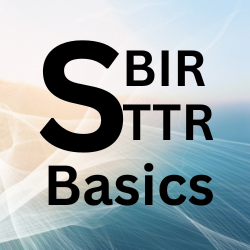Securing funding through programs such as Small Business Innovation Research (SBIR) and Small Business Technology Transfer (STTR) is a significant accomplishment for small businesses navigating the complexities of innovation. These programs provide critical resources to develop technologies that can change industries, improve lives, and create new markets. However, the success of an SBIR or STTR award hinges on the technical and budget proposals and the careful management of funds throughout the project’s duration.
The budget proposal is one of the most critical components of any SBIR or STTR application. Once the agency makes the award, businesses must recognize that the initial budget is just the starting point. They must comply with future requirements to stay within the proposed budget, meet project objectives, and adhere to federal guidelines. Failing to comply can result in penalties, loss of future funding opportunities, and even legal consequences.
This article will examine the importance of crafting accurate budget proposals, monitoring spending throughout the grant period, and ensuring compliance after the award. We will also break down common challenges, provide tips for managing budgets, and outline the steps necessary to stay in good standing with funding agencies.
The Importance of a Well-Structured SBIR/STTR Budget Proposal
The budget proposal is one of the most scrutinized elements of an SBIR or STTR application. It outlines how the applicant will allocate the requested funds across various categories, including direct labor (W-2 employees), fringe benefits, materials, travel, equipment, and other direct costs. A well-structured budget proposal shows that the small business understands how to spend the grant and signals to the funding agency that the company is ready to execute the project efficiently.
However, a good proposal goes beyond simply filling out a form. It should reflect the realistic costs associated with the project and ensure that each dollar requested is essential to achieving the research and development goals. You must justify each cost with documentation, such as cost estimates, quotes, and rationale for why specific expenditures are necessary.
Staying Compliant After the Award: Key Principles
Once the agency grants the SBIR or STTR award, the initial budget proposal becomes the foundation for managing the project. The business must ensure future compliance with the award terms and conditions. Furthermore, the ability to stay within budget by continuously tracking spending, documenting costs, and making adjustments as necessary. The following principles will guide businesses in maintaining compliance with federal funding guidelines throughout the project’s life:
Adhere to the Approved Budget
The awarded budget (actual or modified budget proposal) is a legally binding document, not just a suggestion. Once the funding agency grants the award, the business must adhere to the approved budget. The costs outlined in the initial proposal must align with the actual expenditures incurred during the project.
If the business determines adjustments are necessary due to unforeseen circumstances—such as unanticipated changes in project scope, staffing, or material costs—it is crucial to obtain approval from the funding agency before reallocating funds. Unapproved modifications to the budget could lead to compliance issues, penalties, or even the need to repay some of the funds.
Monitor and Analyze Spending Diligently
To stay compliant, businesses must monitor spending throughout the project duration against the budget as awarded. They must maintain accurate and detailed records of all expenditures, ensuring each cost aligns with the budget categories outlined in the proposal. Businesses should use accounting software or other tools to track expenses and match them to the original budget lines. They must address and document any discrepancies immediately.
Monitoring includes tracking the following key areas:
- Labor Costs: Ensure that direct labor costs (such as salaries or wages) align with the proposed labor rates and hours outlined in the budget.
- Materials and Supplies: Track purchases of materials, equipment, and supplies, ensuring they are used exclusively for the project.
- Fringe Benefits and Overhead: Verify that fringe benefits and overhead costs stay within the proposed limits, as auditors scrutinize them closely during audits.
- Travel and Equipment: Maintain detailed records of travel expenses and ensure that any equipment purchases align with the approved budget.
Understand the Rules for Reallocation
Unforeseen project changes or costs may necessitate the business to reallocate funds between budget categories. For example, a company may find that more funds are required for labor (employees (W-2))but less for contract labor (1099 recipients). Although this is common, it is crucial that the business notifies the funding agency and obtains approval before making significant reallocations.
Each funding agency has different guidelines for budget modifications, and businesses may need prior approval for any significant changes. Keeping the agency informed is essential to ensure these changes don’t compromise compliance.
Get Ready for Audits and Reviews
SBIR and STTR grants are subject to audits and reviews, and businesses must prepare for the possibility of a review at any stage of the project. The review will typically involve thoroughly examining the budget, expenditures, and supporting documentation to ensure the business complies with the terms of the grant.
To be audit-ready, businesses should:
- Maintain detailed records of all expenses and receipts.
- Ensure that the project’s expenditures match the categories and amounts approved in the budget.
- Keep copies of justification documents, such as quotes, invoices, and contracts, to demonstrate how you spent the funds.
- Be prepared to explain any discrepancies or adjustments made to the original budget, especially if you had to make unapproved changes.
Maintain Transparency with the Funding Agency
Transparency is key to maintaining a strong relationship with the funding agency. If the business encounters any challenges or unexpected changes during the project, it should proactively communicate these issues. Whether underspending or overspending in specific budget categories, early communication with the agency can help prevent misunderstandings and ensure that the business complies with the terms of the award.
If the project scope changes or the business expects to underspend or overrun in specific categories, contact the agency immediately and seek guidance on how to proceed. Agencies appreciate companies that are upfront about any challenges and work within the program’s boundaries.
Follow Reporting Requirements
SBIR and STTR awards typically include reporting requirements, including financial reports, technical progress reports, or final reports. These reports are essential for documenting progress, demonstrating compliance, and justifying the use of funds.
Businesses must ensure that they meet these reporting requirements on time and provide accurate information about the budget and expenditures. Failing to submit reports promptly could jeopardize the current award and future funding opportunities.
The Consequences of Non-compliance
The consequences of failing to comply with budget requirements can be severe. In the worst-case scenario, businesses could face:
- Penalties or fines: Depending on non-compliance severity, the funding agency may require businesses to repay all or part of the awarded funds.
- Suspension or termination of the award: If a business fails to comply with budget guidelines, the funding agency may suspend or terminate the award, leaving the company without the necessary funding to complete the project. Furthermore, the need to repay the funds may create a cash flow and/or profit crisis for the company.
- Future disqualification: Non-compliance on one project can severely impact a business’s ability to receive future SBIR or STTR funding. The funding agency may flag mismanagement of funds, leading to disqualification from future opportunities.
Conclusion: Maintaining Budget Integrity Equals Project Success
For businesses pursuing SBIR and STTR awards, the budget is not merely a formality but the cornerstone of project success and compliance. Securing a grant is significant, but the real work begins once the agency awards the funding. Businesses must carefully monitor spending, adhere to the approved budget, and communicate openly with funding agencies.
By doing so, they ensure compliance with federal regulations and pave the way for future innovation and technology development opportunities.
References:
- U.S. Small Business Administration (SBA). (2021). SBIR/STTR Policies and Guidelines. Retrieved from https://sbir.gov
- National Institutes of Health (NIH). (2020). SBIR/STTR Budget Guidance. Retrieved from https://sbir.nih.gov/
- U.S. Department of Energy (DOE). (2021). SBIR/STTR Phase I and II Application Instructions. Retrieved from https://science.osti.gov/sbir

